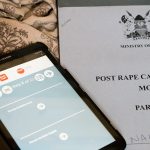In areas that are limited in resources, infrastructure, and security, innovative approaches can make a huge difference in safeguarding human rights.
In the Democratic Republic of the Congo (DRC) and Kenya, PHR and our partners are pioneering ground-breaking technology that will capture and preserve evidence of sexual violence from the moment it is collected all the way to submission in court. Our award-winning MediCapt mobile app allows clinicians to document, securely store, and safely transmit evidence of sexual violence cases so that it can be used to pursue justice for survivors.
But not all innovations require sophisticated technology. PHR experts and staff have worked intensively over the past several years to develop a simple forensic medical form that is transforming the landscape for survivors of sexual violence.
The form helps doctors and nurses ensure that they have not forgotten anything when examining a survivor, and that their report is comprehensible to others working on the case. PHR also trains police, lawyers, and judges to use the form to investigate and prosecute sexual violence cases. The impact of our approach is clear: before the introduction of the form, the vast majority of sexual violence cases were dismissed for lack of evidence. A 2013 study found that almost 90 percent of cases in which the medical form was used resulted in a conviction.
Our simplest and most successful innovation? People-to-people contact. We are leaders in bringing together professionals from the wide range of sectors that work on sexual violence – doctors, nurses, police, lawyers, and judges. Our multi-sectoral training and networking model is breaking ground and making a real difference in securing justice for survivors.



